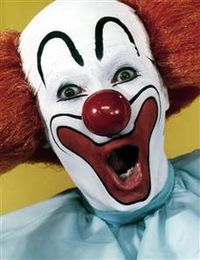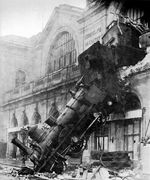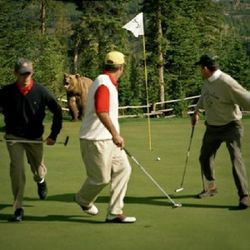Clydebank
“"Jesus, this place is shit"!”
– HM her majesty Queen Elizabeth II
“"Strange people, but they do have a common interest in surviving"”
“"Quite liked the shops, but it smelled a bit"”
“"My Arse!"”
Clydebank (Scottish Gaelic: Feuchin Shitechiolle) is a Large mediumly small sized town approximately 7 miles West of Glasgow along the famous Clydeside Expressway in the West of Scotland. Clydebank is most famous for amongst other things, sewing machines and huge ships and more recently, huge quantities of drugs. The town is situated in the county of West Dumbbastardshire also known as the 'unemployment region of the universe'
The Beginning[edit | edit source]
Clydebank is a relatively new town created in the mid 19th century by Patrick Whitecrook Linnvale Faifley, a landlord who grew so fat that every time he sat down, he burst the seat in his trousers. Annoyed by this fact, he set out to find a solution, and stumbled upon a gap in the market. When buying trousers, he realised that the trouser manufacturers didn't want to know about repairing product they had actually sold. With this in mind, he constructed the largest sewing machine factory in the world on fields along the road from his mansion and called it Singers after the popular pastime of singing. He brought in migrant labour from Nepal and housed them in buildings called "Tenements" Clydebank grew into a town that was in demand by the western worker, and eventually the Nepalese workers were forced out by West of Scotland workers.
Unhappy with the fact that they were only building smaller Sewing machines,some of the West ofScotland workers felt this to be a bit soft. They started the first recorded Union in the UK, calling themselves the "Sewing Machine Unification Trust" or S.M.U.T. The answer to this, was to invest in a large waste ground next to the River Clyde. From here, they realised that they could put their skills and experience to good use and build super industrial sized sewing machines to cover the giant Mediterranean blanket market. This market died after the great blanket crash of 1867 leaving thousands of blanket orientated employees out of work. With an undoubting strength, the Giant Sewing machine manufacturers looked towards a new market and realised pretty quickly that their giant sewing machines looked quite similar to a ship. This needed a "float test" and in May 1869 the first recorded floating sewing machine, sailed down the River Clyde to the port of Greenock. A clever employee named John Brown,decided that the space the giant bobbins were taking up, could be replaced by valuable cargo, so the giant sewing machine idea was scrapped in favour of cargo ships. The Upper Clyde shipyard called John Brown's was born.
The yard went on to build some of the biggest ships in the world including the SS Gargantua, which sank moments after being launched due to communication problems between the various different nationalities who worked at the yards. It was said, that the Peruvian welders couldn't understand the Chinese foreman, and 'forgot' to weld a floor onto the ship. all hell broke loose and WW3 was narrowly avoided when Buckfast was introduced to the union discussions. Several points were brought up during the tense stand off, notably, the Vietnamese contingency's urgency to introduce 'Jack Russel Jalfrezi' into the staff canteen menu. Despite the language barriers, it was announced soon after that there would be a common language for shipyard workers and this would be called Billyconnolese.
Through The Ages[edit | edit source]
As more and more people realised the potential in Clydebank, more and more people turned up to live there. Clydebank in the 1960's could boast a total of 17665 different nationalities living in the town, contributing to a population of some 3.6 million inhabitants. Clydebank gave rise to 'Tapas' a new form of eating animals, and also 'Dogging' the act of voyeurism.
A huge blow to strike the area, was the announcement that the sewing machine factory and the shipyard were closing on the same day in March 1967 putting more than 2,600,000 people on the scrapheap. This caused the largest migration of workforce ever seen and before long the town had emptied, apart from some local diehards, and the Pakistanis, who couldn't be fucked going home and opened some shops instead.
But for it's inventors, it would have became a ghost town. Clydebank had several Inventors clubs and in 1969 became a national inventors science park protected by law, the first of it's kind.
Another first for Clydebank, was the invention of the 'floating tramcar' a modification of the more common tram found in other areas of Britain at the time. The floating concept was invented by the Borough Council, due to the fact they were spending 97.3% of their maintenance budget on tramcar wheel sidewear. The tramcar was 'suspended' on a layer of hair that was collected weekly from Clydebank's 5442 Barbers Shops. It was hailed a success and the concept was tried in other areas, most notably the failed system in Blackpool ( there just wasn't enough hair in the area) Other notable inventions by Clydebank inhabitants included;
- Moon bikes,
- Pneumatic fish tanks
- Fingerless shoes
- Giant buttons
Present[edit | edit source]
Modern day Clydebank is a completely different town from the days of old. The population has settled to around 35,000 inhabitants mainly made up of Bigots, thieves, gangstas, pensioners and unemployed proud people. Favourite past times of the modern 'Bankie' include puppy baiting, drug dealing & shouting at the moon.
Clydebank has around 1675 drug dealers currently employed and it is said that if you can't get a particular drug in Clydebank, the product hasn't been invented yet.
National bus company 'First Bus' caused outrage by declaring recently, that they were stopping buses from entering Clydebank due to the fact their buses & drivers were being attacked by the local youths, prompting local dignitary Mrs Ina Halley to remark "The kids of today don't know they are born, they never had to fight a war and I wish the floating hair trams would return and that the local youths would get tae fuck". The youths like to be known as Neds, the indigenous young person found in most towns Scotland. Neds favourite pastimes include annoying people, drinking Buckfast & Sunny D spritzers , swearing a lot, and wearing white Adidas tracksuits and Burberry baseball caps while smoking 'Mayfair lights'.

Clydebank is famously known for the amount of alchohol consumed on a Friday. The local roads are often gridlocked with delivery trucks bringing the alchoholic products to the town's ASDA. A spokesman for drinks giant United Breweries, once stated "If it wasn't for Clydebank, we'd all be out of a job. Clydebank also consumes approximately 48% of the entire stock of Buckfast Tonic Wine (only surpassed by the town of Airdrie with a whopping 52% of sales. This was summed up in a recent interview with one of the Abbey monks who said "If it wasn't for Airdrie & Clydebank, we'd be fucked".
It is also worth noting that the evil emperor Tesco has not yet discovered Clydebank due to the fact he is on crusades to other planets at the moment, (there being talk of a Tesco Express being opened on Halley's Comet). But rest assured, he will get round to Clydebank, one day.
Economy[edit | edit source]
Clydebank cannot rely on the tourist dollar due to the fact that no tourist in their right mind would visit the area, so the local economy is somewhat propped up by the benefits office with a reported 87% of people on Incapacity Benefit. This means out of a total population divided by 67% of the able bodied, only 10% of 57% can be said to be 5% capable of holding down a job in the labour market. Mcdonalds burger restaurant recently held a recruitment drive, but had to pull out due to the fact that nobody applied for the job(s) because the interviews were held before 11 am. Another large contributor to the local economy comes from the selling of narcotics that the council has successfully been able to tax. This amount equates to the entire national debt of Bolivia.
Sport[edit | edit source]
Clydebank has several local sports that the more athletic can take part in. These sports include Swimming (in the canal, trying to escape some neds), Running (away from the police),High jumping (over the checkouts in Asda with stolen booze), and Snooker (Played in the only licensed premises you can flout the smoking ban).
Clydebank has an annual golf tournament involving the youths (or Neds, called 'the rumble'. It involves boozed up teenagers, creating running battles in the town's suburbs. The winners are the 'young team' who chase away all the others with golf clubs. So popular was this tournament, the teenagers decided to stage it every weekend.
Future[edit | edit source]
It doesn't look good. Especially when evil emperor Tesco arrives.




